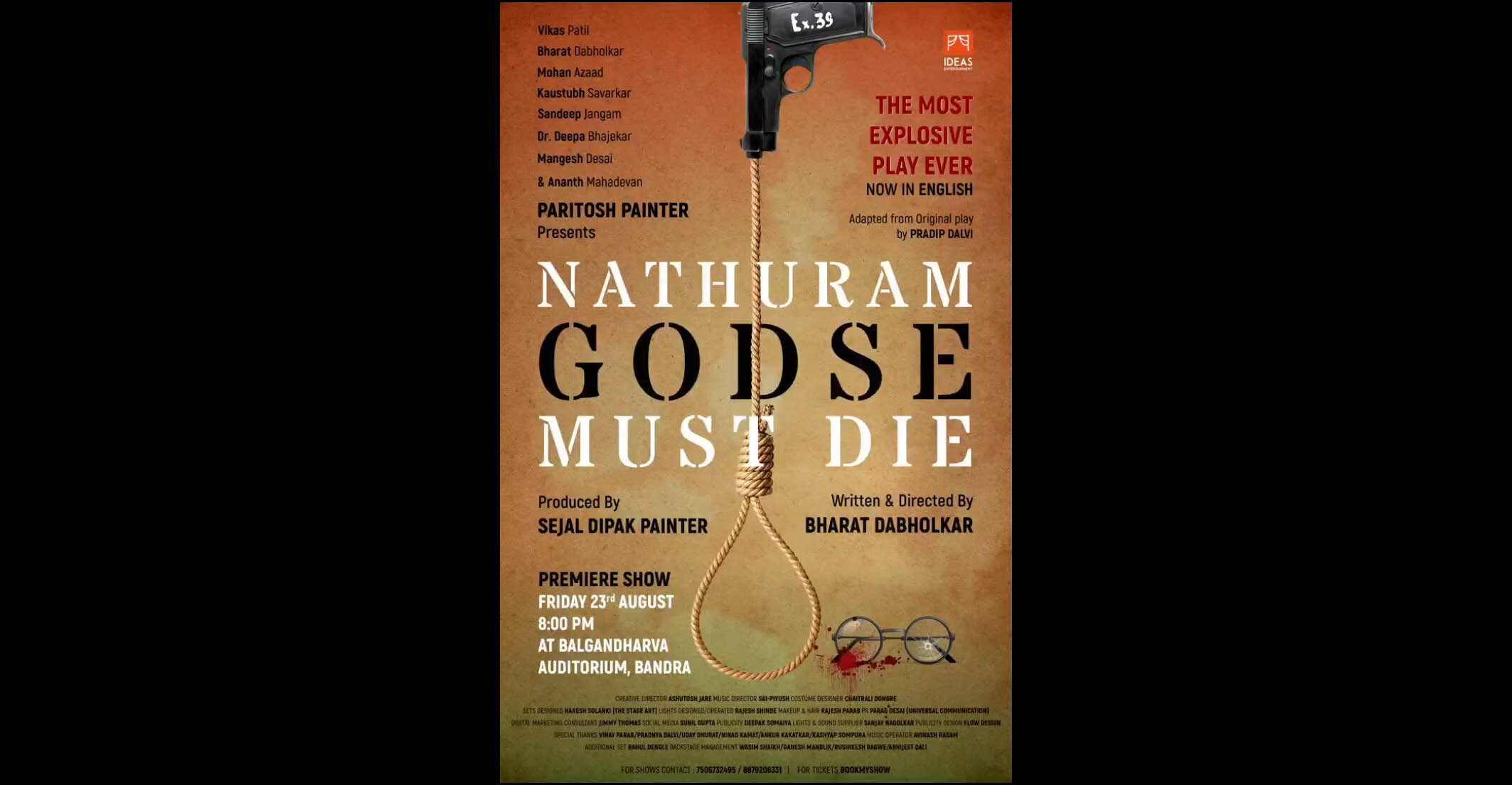The play Nathuram Godse Must Die written and directed by Bharat Dabholkar is wildly propagandist, glorifies the murderer of Mahatma Gandhi and is full of distortions even while it claims to be very objective. The more shocking part about the play in English was that many in the upper class, so-called educated audience at St Andrews auditorium in Bandra last night were visibly appreciative, smiling, even clapping at times. After the performance I made it a point to talk to several people and was shocked to find that they thought Godse had a strong case in his favour. These included three French persons, two young women and a young man, they too seemed appreciative, one could not blame them since they could be could not be expected to be aware of much of our political history. But what about the others, many of them had come in their posh cars, enjoying free parking in the auditorium premises? One thing that seemed common to many was their supreme ignorance and prejudice. At the end I ran into Mrinalini Kher, great grand-daughter-in-law of B.G. Kher who was the chief minister of the then Bombay state at the time of the Gandhi murder and evidence suggests that he like many others was aware in advance of the murder conspiracy to kill Gandhi. Those at the highest level in Delhi, barring the likes of Nehru, refused to take cognisance. I used to know Kishore Kher, great grandson, of Mr Kher, he and Mrinalini used to be involved in improving the lives of school drop-out kids. To my relief I also met Pradeep Mandhyan, advocate, involved in civil liberties cases, who could see through the play.
One had expected much better from Dabholkar who has adapted the original Pradeep Dalvi play in Marathi Mee Nathuram Godse Boltoy (I am Nathuram Godse speaking). I had seen it more than 25 years ago in Mumbai. Even then people had clapped, I immediately wrote a report for the Times of India where I was working, it was, however, suppressed. The Marathi version was directed by Vinay Apte, who was associated with the Sangh Parivar, and the actor Sharad Ponkshe, playing Godse, remains to this day a great admirer of Godse in real life.
Dabholkar is much better educated than Dalvi, has a much better social exposure with his experience in advertising and other fields; he is financially better off. I have enjoyed some of his humour. Unfortunately, he leaves a a much worse taste in the mouth, with this play, than the earlier one. He claims to be impartial but gave himself away during the bow to the audience after the performance when he announced that those who wanted to see the clothes and other belongings of Godse could see them in Godse’s house in Pune. This clearly shows his bias in favour of Godse. He retains some of the wildest distortions of the original with clearly fake characters and scenes regarding the trial.
As Y.D. Phadke[1], the eminent scholar and political science professor, wrote in response to the Marathi play that characters of inspector Shaikh and sub inspector Sawant simply did not exist in real life, in the trial. There is so much nonsensical fiction thrown into the play, Devdas Gandhi , son of the Mahatma, is shown to be a lawyer who wants to take up the case of Godse, his meetings with Godse are shown. In fact, no such meetings took place and Devdas was not a lawyer. More ludicrous is the scene of a burqa clad Zubeida, showing her great afffection, respect for Godse, and she is the sister of the fictitious inspector Shaikh who also becomes an admirer of Godse! Too many falsehoods to be mentioned here.
A note. Since the issue dealt here is sensitive, comments if any may be moderate in tone. (This was for Meta Facebook where the post appears) Extremists, please look elsewhere if you want to write on this.
The volume, Beyond Doubt, A Dossier on Gandhi’s Assassination, edited and introduced by Teesta Setalvad brings to light the report of the Kapur Commission which was appointed by the Government of India in 1965 to examine the depth and scope of the conspiracy that lay behind the killing of Gandhi.
This three-volume report has been absent from the public domain though it contains invaluable evidence—intelligence reports, oral and documentary evidence—of the extent of complicity behind the hate-driven conspiracy that resulted in the Mahatma’s killing.
On November 12, 1964, at a programme organized in Pune, Dr G.V. Ketkar, the grandson of Bal Gangadhar Tilak, disclosed that six months before the actual criminal act, Nathuram Godse had disclosed his intentions to kill Gandhi. This information was passed on by him via others to the Chief Minister of the then Bombay state, B.G. Kher. Not only was Ketkar arrested but a furore ensued in the Maharashtra State Assembly and the Indian Parliament at the time. In 1965, the Government of India set up a Commission of Inquiry into the Conspiracy to Murder Mahatma Gandhi, headed by Justice Jeevan Lal Kapur, a former judge of the Supreme Court. The commission examined evidence not produced during the trial. Justice Kapur concluded that the facts showed that a clear conspiracy existed on the part of Hindu supremacist groups.
(The author, a senior journalist with The Times of India wrote this on meta/Facebook; https://www.facebook.com/share/p/gnM6x6wsr1ykaXp7/?mibextid=WC7FNe; this version has been edited slightly–Editors)
[1] Communalism Combat, in October 2000 published, in translation, extracts from noted historian, YD Phadke’s book in Marathi, Nathuramayan. This was titled, The murderer as martyr https://sabrang.com/cc/comold/oct00/cover1.htm. It is also available on https://sabrangindia.in/murderer-martyr/#:~:text=In%20independent%20India%2C%20politics%20has,his%20statement%20to%20the%20court. This article by eminent historian YD Phadke had exposed Pradeep Dalvi’s claim about his play, Mee Nathuram Godse Boltoye, being based on historical facts as completely bogus. Nathuramayan is a compilation of a series of incisive articles by the (The article in Marathi was first published in the Marathi eveninger, Apla Mahanagar and translated for us into English by Mukta Rajadhyaksha).
